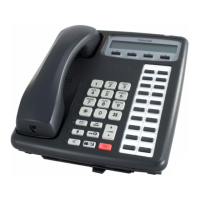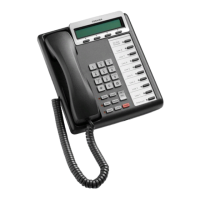Token Programming
Defined Tokens
Strata CIX Voice Mail Programming 01/07 11-9
Token Programming
KI( )
Position of substring in string–the KI( ) token searches string for the first occurrence of substring.
The result of the search is the position of the substring within the string, and it is stored as the
variable.
Syntax KI(substring,string,%Sn)
where:
substring Any alphanumeric substring. Can be a variable.
string Any alphanumeric string. Can be a variable.
%Sn One of the %S storage variables (range: 0~19).
Example KI(”d”,”abcdefg”,%S0)
Searches string “abcdefg” for the first occurrence of substring “d,” and places the value of the position
of the substring within the string in storage variable 0. The result is the %S0 variable containing 4,
because “d” is the fourth character in the string.
KL( )
Log caller into mailbox–immediately logs caller into the mailbox.
Note Cannot be used in the Notify Menu.
Syntax KL(uid)
where:
uid Valid mailbox.
Example KL(239)
Logs the caller into Mailbox 239
KR( )
Creates a recording–if the destination is an existing mailbox, Stratagy ES inserts the recording into
that mailbox as a new message. Otherwise, the destination is assumed to be the name of an existing
file and the recording is placed there.
Syntax KR(dest)
where:
dest Destination–mailbox or file (valid DOS file name). Can be a variable.
Example KR(532)
Inserts the recording in Mailbox 532 as a new message.
KT( )
Directs calls to a designated User ID when DSS function is active (dss_active = true), the DSS port is
assigned in the “answering” mailbox, and the Night Transfer on the DSS console is On.
Syntax: KT(XXX)G(YYY)
where:
XXXBox number used when Night Transfer is On.
YYYBox number used when Night Transfer is Off.
Table 11-3 Defined Tokens (continued)
Token Description

